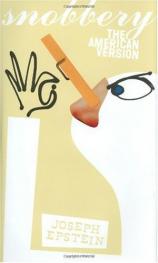Snobbery: The American Version
Review
Snobbery: The American Version
Do we really need a book to tell us what snobbery is and how it
infects all the nooks and crannies of society? Have fashions in
snobbery changed in the past half century? Is snobbery in America
significantly different from snobbery elsewhere? Is author Joseph
Epstein himself a snob? Am I?
These are some of the questions that might flit through a reader's
mind as they glide through Epstein's enjoyably lightweight survey
of the American snobocracy. Epstein, a man of impressive academic
standing, has not here delivered of himself a weighty academic
analysis. Rather, he has skimmed lightly over the surface of his
topic, dropping some names, defecating on others, keeping the tone
of his discourse breezily informal. This is not really a necessary
book but it is fun to read.
Your true snob, says Epstein, has two goals in life --- to play up
to those above him on the social ladder and to keep himself ahead
of those below. These objectives govern his every move in life ---
what he eats, what he wears, what he reads, where he lives, what he
drives, who he admires, where he (or his kids) go to school. Is
this news? Perhaps not, at least for serious observers of the
social scene.
Another of his basic messages is that the old pre-World War II
snobbery barometer, calibrated by social standing, elite schools,
debutante balls and WASPishness, has given way to a new one that
measures "celebrity" status, restaurant choice, charity work, and
career choice among other things. It now also defers to such former
outcasts as Jews and homosexuals. The one factor constant in both
eras, of course, is what Epstein calls "serious wealth."
Epstein takes aim at some easy targets in his survey: Wine
connoisseurship, country club membership, name-dropping, fashion;
and he can be nasty indeed when someone or something really excites
his ire (Teddy and Jacqueline Kennedy, Susan Sontag, The New
York Review of Books, Gore Vidal, virtually anything and
everybody French); but in general his tone is fairly civilized, his
barbs leavened with a dash of wry humor.
One surprising exception to this, given the author's academic
standing and his 22 years as editor of The American Scholar,
is his unremittingly sour assessment of American higher education.
He damns American colleges almost without exception as shallow
places that concentrate on nonessentials and turn out graduates as
vacuous as they themselves are. For the old Yale-Harvard-Princeton
axis of "best schools" he has invented a derisive portmanteau word:
Yarvton. And his assessment of old Yarvton is scathing. These
places, he insists, get by merely on no-longer-valid reputations.
If it is still thought better to go to Yarvton than to Arizona
State --- and it is --- that is merely a symptom of the
indestructibility of snobbish prejudices.
Epstein delivers his lightweight sermon deftly and readably,
inventing along the way some delightfully self-explanatory new
words: Statustician, snobographer, virtucrat. He is himself a
leading character in the book, his personal snobberies admitted and
dissected along with everyone else's. He devotes pages to
explaining the subtle differences and ramifications of snobbery's
subgenera --- class, taste, status, prestige, fashion,
celebrity.
One strange aberration is his attempt to define what a truly
snobbery-free person might be like. This paragon, it seems, would
be "on the lower edge of the old upper class," would have had some
public schooling but then would have attended Andover or Groton,
then Harvard or Princeton (now where does that leave Yarvton?),
would have the necessary supply of money and an attractive Jewish
wife and two kids who play tennis and are serious swimmers. Doesn't
sound like anyone I know.
The end result of all this Sociology Lite is a diverting book, but
one that need not be taken terribly seriously. Most readers, one
imagines, will find themselves impaled on Epstein's sharp prose at
some point --- maybe through their reading habits, taste in music,
or the names of their children --- but not to worry. Snobbery is
everywhere. It is inescapable. One is reminded of the advice
supposedly once given by a government agency to a fellow desperate
to rid his suburban lawn of dandelions: If all else fails, "learn
to love the little things and live with them."
Reviewed by Robert Finn (Robertfinn@aol.com) on January 23, 2011
Snobbery: The American Version
- Publication Date: July 9, 2002
- Genres: Nonfiction
- Hardcover: 288 pages
- Publisher: Houghton Mifflin Harcourt
- ISBN-10: 0395944171
- ISBN-13: 9780395944172





